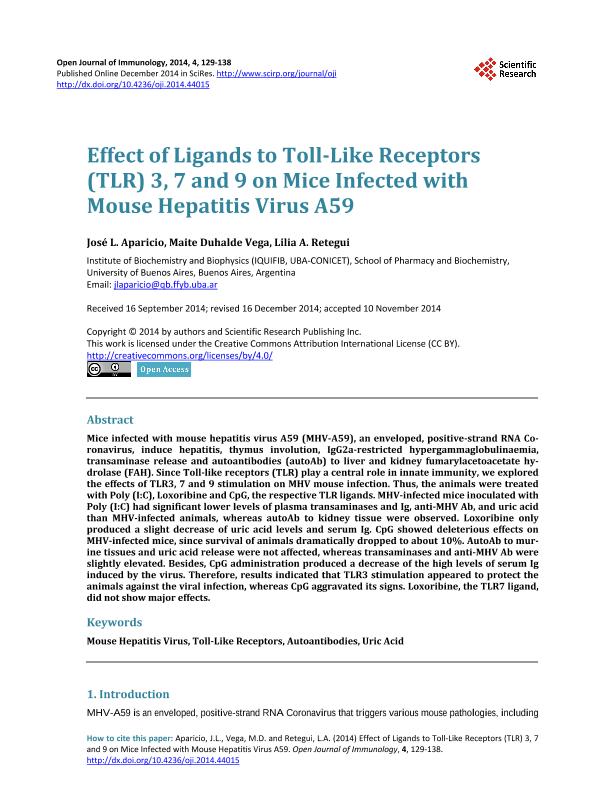Mostrar el registro sencillo del ítem
dc.contributor.author
Aparicio, Jose Luis

dc.contributor.author
Duhalde Vega, Maite

dc.contributor.author
Retegui, Lilia Alicia

dc.date.available
2017-06-13T17:51:49Z
dc.date.issued
2014-12
dc.identifier.citation
Aparicio, Jose Luis; Duhalde Vega, Maite; Retegui, Lilia Alicia; Effect of ligands to toll-like receptors (TLR) 3, 7 and 9 on mice infected with mouse hepatitis virus A59; Scientific Research Publishing; Open Journal of Immunology; 4; 4; 12-2014; 129-138
dc.identifier.issn
2162-450X
dc.identifier.uri
http://hdl.handle.net/11336/18108
dc.description.abstract
Mice infected with mouse hepatitis virus A59 (MHV-A59), an enveloped, positive-strand RNA Co-ronavirus, induce hepatitis, thymus involution, IgG2a-restricted hypergammaglobulinaemia, transaminase release and autoantibodies (autoAb) to liver and kidney fumarylacetoacetate hy-drolase (FAH). Since Toll-like receptors (TLR) play a central role in innate immunity, we explored the effects of TLR3, 7 and 9 stimulation on MHV mouse infection. Thus, the animals were treated with Poly (I:C), Loxoribine and CpG, the respective TLR ligands. MHV-infected mice inoculated with Poly (I:C) had significant lower levels of plasma transaminases and Ig, anti-MHV Ab, and uric acid than MHV-infected animals, whereas autoAb to kidney tissue were observed. Loxoribine only produced a slight decrease of uric acid levels and serum Ig. CpG showed deleterious effects on MHV-infected mice, since survival of animals dramatically dropped to about 10%. AutoAb to murine tissues and uric acid release were not affected, whereas transaminases and anti-MHV Ab were slightly elevated. Besides, CpG administration produced a decrease of the high levels of serum Ig induced by the virus. Therefore, results indicated that TLR3 stimulation appeared to protect the animals against the viral infection, whereas CpG aggravated its signs. Loxoribine, the TLR7 ligand, did not show major effects.
dc.format
application/pdf
dc.language.iso
eng
dc.publisher
Scientific Research Publishing
dc.rights
info:eu-repo/semantics/openAccess
dc.rights.uri
https://creativecommons.org/licenses/by/2.5/ar/
dc.subject
Mouse Hepatitis Virus
dc.subject
Toll-Like Receptors
dc.subject
Autoantibodies
dc.subject
Uric Acid
dc.subject.classification
Otros Tópicos Biológicos

dc.subject.classification
Ciencias Biológicas

dc.subject.classification
CIENCIAS NATURALES Y EXACTAS

dc.title
Effect of ligands to toll-like receptors (TLR) 3, 7 and 9 on mice infected with mouse hepatitis virus A59
dc.type
info:eu-repo/semantics/article
dc.type
info:ar-repo/semantics/artículo
dc.type
info:eu-repo/semantics/publishedVersion
dc.date.updated
2017-06-09T15:01:42Z
dc.journal.volume
4
dc.journal.number
4
dc.journal.pagination
129-138
dc.journal.pais
Estados Unidos

dc.journal.ciudad
Delaware
dc.description.fil
Fil: Aparicio, Jose Luis. Consejo Nacional de Investigaciones Científicas y Técnicas. Oficina de Coordinación Administrativa Houssay. Instituto de Química y Físico-Química Biológicas "Prof. Alejandro C. Paladini". Universidad de Buenos Aires. Facultad de Farmacia y Bioquímica. Instituto de Química y Físico-Química Biológicas; Argentina
dc.description.fil
Fil: Duhalde Vega, Maite. Consejo Nacional de Investigaciones Científicas y Técnicas. Oficina de Coordinación Administrativa Houssay. Instituto de Química y Físico-Química Biológicas "Prof. Alejandro C. Paladini". Universidad de Buenos Aires. Facultad de Farmacia y Bioquímica. Instituto de Química y Físico-Química Biológicas; Argentina
dc.description.fil
Fil: Retegui, Lilia Alicia. Consejo Nacional de Investigaciones Científicas y Técnicas. Oficina de Coordinación Administrativa Houssay. Instituto de Química y Físico-Química Biológicas "Prof. Alejandro C. Paladini". Universidad de Buenos Aires. Facultad de Farmacia y Bioquímica. Instituto de Química y Físico-Química Biológicas; Argentina
dc.journal.title
Open Journal of Immunology
dc.relation.alternativeid
info:eu-repo/semantics/altIdentifier/doi/http://dx.doi.org/10.4236/oji.2014.44015
dc.relation.alternativeid
info:eu-repo/semantics/altIdentifier/url/http://www.scirp.org/journal/PaperInformation.aspx?paperID=51428
Archivos asociados
